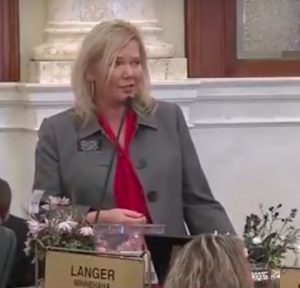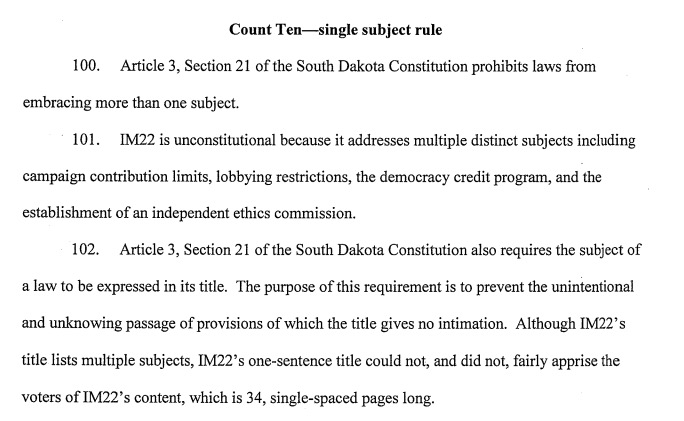Last updated on 2020-11-22
Alas, the Legislature is not listening to constitutional or practical conservative sense on House Bill 1007. The hoghoused bill, which now simply reads, “No initiated measure may embrace more than one subject, which shall be expressed in the title,” made it through the Senate yesterday on a 21–13 vote.

Senator Kris Langer (R-25/Dell Rapids), apparently saddled with shepherding HB 1007 through the Senate, simply told her colleagues to send the bill to conference committee so we can work out the lingering questions about enforcement.
Attorney Senator Craig Kennedy (D-18/Yankton) read Article 3 Section 21, the constitutional single-subject rule that applies to all South Dakota laws, and asked Senator Langer why we need HB 1007. (This is the same question I posed a couple weeks ago when I noticed the single-subject hoghouse.) Following is the full text of Senator Langer’s response:
That is definitely the reason for this bill so we can go ahead and go back and realize—figure out why sometimes we do have initiated measures that seem to have more than one subject [Senator Kris Langer, Senate floor, 2018.02.27, 34:33].
Translation: I have no clue.
Senator and aspirant to the A.G.’s office Lance Russell (R-30/Hot Springs) agreed with the thesis of Senator Kennedy’s question and blasted HB 1007 as games-playing. He said that the Legislature and initiated measures both the single-subject rule. He alleged that HB 1007 is really just a vehicle for some secret purpose that “flies in the face of a constitutional provision that we simply ignore.” Russell said, “I’d certainly like to know what the intent of this bill is before it gets passed here today. And we have absolutely no idea—somebody does, but it sure isn’t me.” A vehicle bill at this late stage of Session, said Russell, “gets to how absurd our process has become, and I would hope that we would have more respect for it than what we’re doing here today.”
Senator Reynold Nesiba (D-15/Sioux Falls) asked how a single-subject restriction on initiatives would be enforced. Again, Senator Langer had no specific response, just an appeal to the wisdom of conference committee. Senator Nesiba said HB 1007 sounds like a recipe for bogging down initiatives in more litigation and nodded to Kennedy’s earlier point about redundancy.
Anti-democracy Senator Jim Bolin (R-16/Canton) defended the hoghousers as “good-faith” sponsors and averred there is no further secret hoghousing intent. He nonetheless said he would vote against it.
Senator R. Blake Curd (D-12/Sioux Falls) jumped a little harder on Senator Russell’s allegation, rising to “reject outright” the suggestion that HB 1007’s hoghousers have some “nefarious or hidden agenda.” Speaking to Kennedy’s objection, Senator Curd offered his “layman’s interpretation” that initiated measures are not laws and thus are not subject to Article 3 Section 21… which is darned funny, because that’s the opposite of what he, Langer, and other Republican Senators said in the lawsuit Curd led in November 2016 against Initiated Measure 22:

Pick a lane, R. Blake.
With the statements against making more sense than the statements for, 21 Republicans said who cares? and voted to pass HB 1007. Seven Republicans (Bolin, Jensen, Nelson, Otten, Russell, Soholt, and White) joined our six good-sense Democrats and voted nay.
We must now watch for the conference committee members to be named and then watch them closely to make sure they don’t take the path Senator Russell warns is in store and pile all sorts of new monkeyshines onto the initiative process.
Of course, there may be no conference committee: it is possible the House could simple accede to the Senate’s changes and call HB 1007 good. The Senate State Affairs amendment removed this seemingly redundant sentence:” If more than one initiated measure is submitted at the same election each shall be so prepared and distinguished that it can be voted upon separately.” That final amendment also struck a January 1, 2019 enactment date, which could open up any initiatives on this year’s ballot for legal challenge on July 1, before the election. Hmmm… would anyone care to challenge Initiated Measure 25, Speaker Mickelson’s tobacco tax for vo-tech education, as a multi-subject initiative? Raising a tax on tobacco, subsidizing vo-tech tuition… boy, sure sounds like two separate subjects….
The people who violate the single subject rule the most are legislators, governors, state agencies and legislative committees that introduce governor and agency bills. It would be nice to wring all of this out of the system by the following method: there can be as many multiple subject initiatives as there were in the previous two sessions of the Legislature. If Legislators are serious about not wanting multi-subject initiatives, they will curb their own transgressions.
It sure looks like the HB1007 hoghouse really needs cleaning! It does not pass the smell test.
Alas, there appears to be no reliable, binding legal definition of “single subject” to enforce this rule. As Mr. Pay and Senator Russell both note, the Legislature violates this rule all the time. The status quo offers the best solution: leave initiative alone, and let the voters be the filter. Offer the voters some wild omnibus bill, and odds are they’ll nuke it 70–30. And on the off chance that some industrious petitioner writes and omnibus bill that does ten different things that are all so awesome that everybody wants them… well, why stand in the way? If we have a year to read it, and the press and the debates make clear that an initiative does multiple things, and if the majority says, “Have at it,” is there any reason to balk at making all of those changes in one fell swoop?